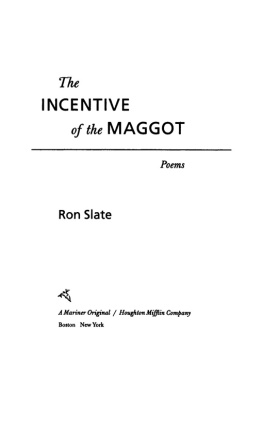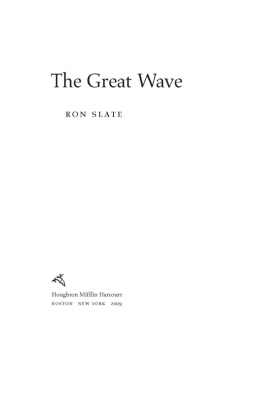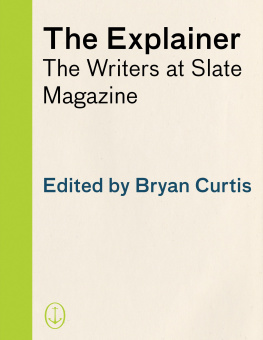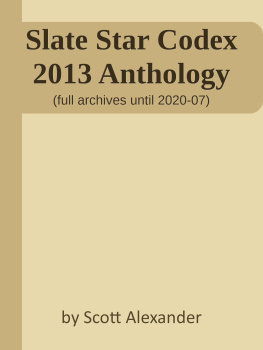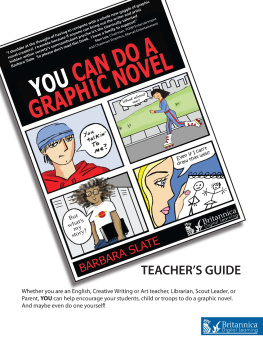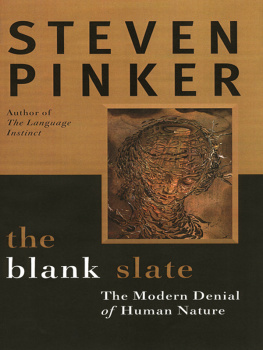Copyright 2005 by Ron Slate
ALL RIGHTS RESERVED
For information about permission to reproduce
selections from this book, write to Permissions,
Houghton Mifflin Company, 315 Park Avenue South,
New York, New York 10003.
Visit our Web site: www.houghtonmifflinbooks.com.
Library of Congress Cataloging-in-Publication Data
Slate, Ron.
The incentive of the maggot : poems / Ron Slate.
p. cm.
"A Mariner original."
ISBN 0-618-54358-9
I. Title.
PS 3619. L 365153 2005
811'.6 DC 22 2004060947
Book design by Melissa Lotfy
Printed in the United States of America
QUM 10 9 8 7 6 5 4 3 2
For my wife, Nancy Gilson,
for our children, Abigail, Jenny, and Stacey,
and for all who remember Lester Gilson
Foreword
Poetry that is "better than the movies": Ron Slate's The Incentive of the Maggot meets that challenge, tossed by Frank O'Hara in his mock manifesto, "Personism." Slate understands that art must first of all (as O'Hara's predecessor Henry James requires) be interesting. Inter est: what is between or among, as in "financial interest" or "shared interest" or "national interest."
And the interesting fact of nations appears in the first section of this book, where tides include "Writing Off Argentina," "Belgium," "Small Talk in Munich," and "The Plan for Cyprus." Conventional expectation is for poetry to deal with political, historical material as a matter of sensibility: with rhetoric more than thought, with slogans rather than complexity. When it comes to politics, the poet may be expected to take righteous, easy attitudesagainst atrocity and in favor of peace, just like the politicians.
These poems are the opposite: muscular, ironic, informed. Slate's characteristic movement is a quick, nervous progress away from the superficial, through erratic reversals and subversions, toward a rediscovery of the starting point, transformed. That arc, the course from innocence to serpentine consideration, reflects an attraction of Slate's work: these are distinctly the poems of an adult.
For instance, any sophomore might quote a political figure's joke. "Belgium" opens:
Invented by the British to annoy
the French, so said De Gaulle.
The Belgians are rude but live to please.
But this little formula evolves into the motif for variations on the theme of power, need, the conduct of nations and people: peace among western nations "to annoy the Chinese"; Belgium as a battleground in 1915, needing help to feed its eleven million people; Herbert Hoover heading the relief effort and believing in an elite of "uncommon men"; contemporary Brussels as a theater for international law where, as "uncommon men," diplomats come
for reassurance, each voice will be heard,
each nation will achieve the goal
of living off all the other nations.
A relation of men dominating men.
Now it's your turn, now mine.
The guards take a look under the limo
and wipe for traces of ill intent.
A first-person element threads through the poem: early on, "We dress for dinner / but the ambassador dresses down"; then, near the end, "I sign the guest book." The terms of manners"annoy" and "rude" in De Gaulle's little quip and the succeeding linefirst appear as a joke about nations, as though they behave on the same level as individuals. Then the poem takes another view, in which the levels of individuals and nations are not so easy to separate, their joining not so absurd: signing the guest book, bearing ill intent and wiping for traces of it are individual actions in one way but in other ways dictated by global forces. Conversely, nations compete and struggle like "common men."
This first group of poems brings together the personal and the global in a way that is distinctive, subtle, defying expectations about what is political and what is personal. Cultural meanings and symbols shift unreliably, eroding the sense of individual destiny. In "End of the Peacock Throne," the New Year's symbol of a rose, printed in a newspaper, is read by the shah's secret police as a coded insult, occasion for arrest and torture; in "The Plan for Cyprus," a concert of players who "come in neither peace nor war" makes the idea of neutrality seem not merely hopeless but perhaps corrupting to the players.
That first section prepares the way for a book that is increasingly intimate in feeling, even in occasional detail, without conventional moves of autobiography or first-person lyric. The tide poem, for instance, resists clichs of personal narrative, just as the first poems in the volume resist clichs of global perspective. The introductory scene is of young nurses summoned to observe a severe case of gangrene, apparently accelerated by anti-infection medication. That situationthe nurses who study the terrible wound, the uncurable dilemma that the medication for one problem exacerbates another problem, the mechanical, fallible attempt at instructive lookingis another little tune that will snake through its variations and complexities:
They make them look
at the uncurable, and struggle with the sense
of regimen, while we in the waiting room
wait for outcomes and the screen flashes
with the image of a small plane crashing,
then crashing again in slow motion,
a privately owned twin-engine tilting
at the runway cleared for its return.
Overheated room, everyone is nodding off.
Insurgents shot in Sri Lanka and Liberia.
Bones found nearby in the Neponset marshes.
The patients in the waiting room cannot be blamed for dozing through various horrors on the TV news; then we are startled by returning to the nurses, but also to an implied poeticsor is it an ethics?that is suspicious of spectacle:
So a young nurse, of a particular temperament,
may come to resent, may angrily refuse
to use grief for the purpose of edification.
She may feel contempt for a journalist's catalogue
of atrocities, genitals beaten with a ruler.
Not because they are not actual,
but because someone looked and discovered nothing.
Then, abruptly, Josephus's description of Herod the Great suffering with gangrene: "The brains behind / the Slaughter of the Innocents died of gangrene / in his penis." Then another unexpected, abrupt twist back to the television news, but to what is forbidden to be looked at:
But we will not have to look at the coffins
of our dead soldiers. They will not let us
gaze on their coffins, in transit.
Praise for the edict that will not permit
videotape to roll over the suddenly dead.
Praise for this moment of pause, of darkness.
The power here is not simply in the ironic "praise" but in the doubling back that teases complacency: like the theoretical nurse who objects to the voyeuristic, bland catalogue of atrocities, the repressive government officials are on the side of not seeing something repellent, though for radically different reasons. And the unseen coffins are in some ways more instructive than the bones in Neponset or the plane visibly crashing again and again in slow motion.
This resembles the doubleness of the infection-fighting drugs that as a side effect "encourage the gangrene." But the idea of the destructive cure is itself reversed in the closing lines:
Not long ago I sat with a clairvoyant;
she said in my past life
I was slain on an English battlefield.
But others were saved by green blowflies,
their larvae made a soup in the gashes and rips,
dressed the wounds and farmed our flesh.
The survivors lay in a drowse of pain.
Timelessly they stirred, rose up, staggered in boots
and quickened their steps, as if they had discarded
the dead parts of themselves.
This is a tormented as well as bold meditation on ambiguities of corruption and survival, of witnessing and ignoring, of instruction and oblivion. The scale of disorder and the tortuous reversalsinfections that preserve, larvae that healare commensurate with Slate's resolve to keep these irresolutions not merely paradoxical but urgent: measures of difficulty.
Next page
